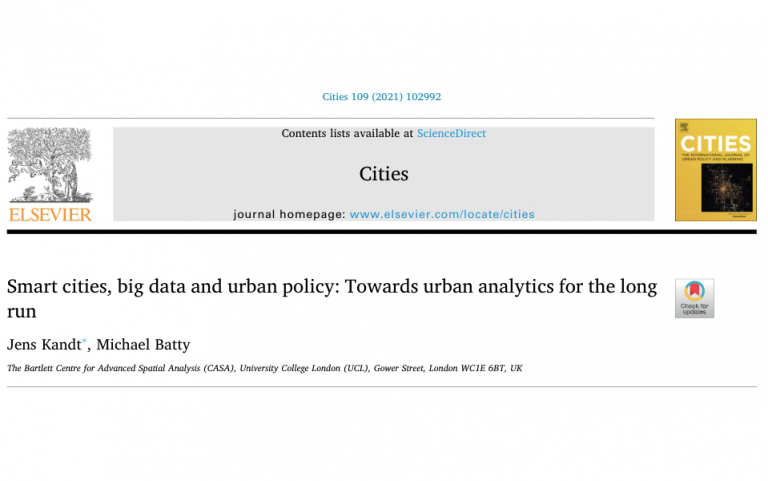Smart cities, big data and urban policy: Towards urban analytics for the long run
2 February 2021

For the latest volume of Cities Journal (February 2021), Professor Mike Batty and Dr Jens Kandt publish "Smart cities, big data and urban policy: Towards urban analytics for the long run", outlining a social science perspective on urban analytics and formulating propositions for urban policy.
The publication can be downloaded here. Dr Adam Dennett described the paper as "Essential reading for any student arriving at CASA and for anyone who has ever wondered why what we do is important. It's a fantastic critical exploration of how the core business of CASA - essentially urban data analytics and modelling - sits within a wider and still emerging digital urban landscape. Crucial work if the potential of data and analytics in urban governance is to be realised."
Highlights
- We chart the genesis of urban analytics drawing on current social science theories.
- We identify opposed temporalities of big data analytics and urban policy
- We identify strategies to address resulting epistemological challenges of urban analytics.
- We outline conditions under which urban analytics contributes to long-term urban policy.
Abstract
The analysis of big data is deemed to define a new era in urban research, planning and policy. Real-time data mining and pattern detection in high-frequency data can now be carried out at a large scale. Novel analytical practices promise smoother decision-making as part of a more evidence-based and smarter urbanism, while critical voices highlight the dangers and pitfalls of instrumental, data-driven city making to urban governance. Less attention has been devoted to identifying the practical conditions under which big data can realistically contribute to addressing urban policy problems. In this paper, we discuss the value and limitations of big data for long-term urban policy and planning. We first develop a theoretical perspective on urban analytics as a practice that is part of a new smart urbanism. We identify the particular tension of opposed temporalities of high-frequency data and the long durée of structural challenges facing cities. Drawing on empirical studies using big urban data, we highlight epistemological and practical challenges that arise from the analysis of high-frequency data for strategic purposesand formulate propositions on the ways in which urban analytics can inform long-term urban policy.
 Close
Close

